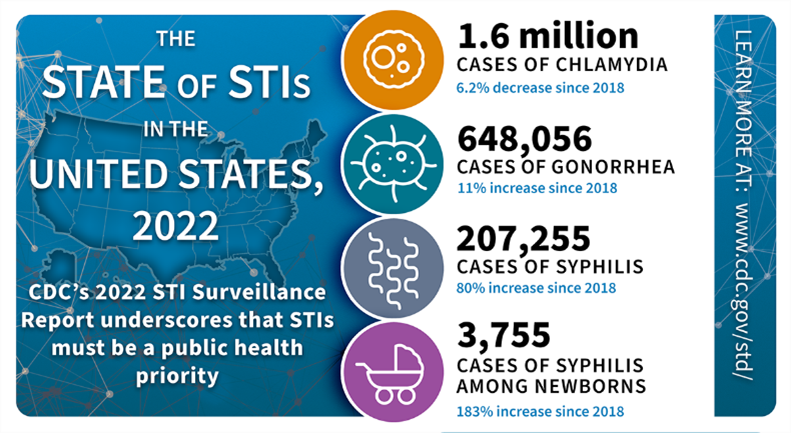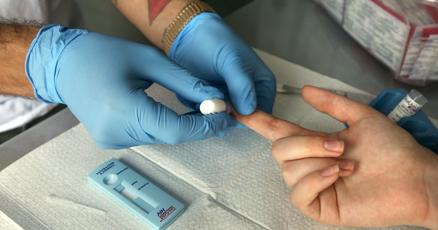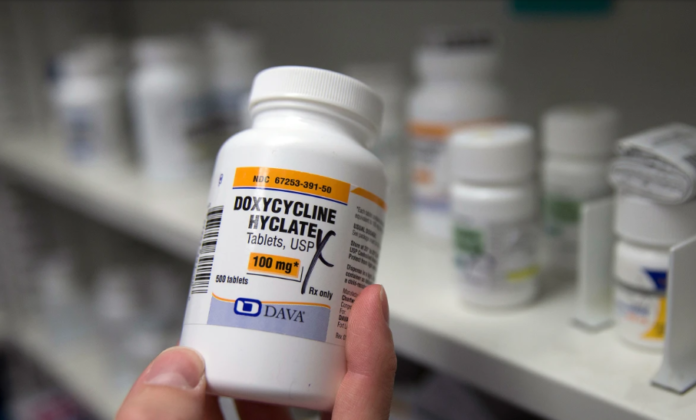According to recent study, taking an antibiotic after sexual activity or even just a minor dosage each day significantly lowers the risk of STDs.

A recent public health initiative aims to utilize one such drug to prevent STIs in the first place rather than just treating them with antibiotics.
While promising research into variants on this technique has sparked optimism, there are also worries about the possibility that this technique might exacerbate drug-resistant infections, another public health challenge.
One thing is certain: Given the dramatic increases in gonorrhea, chlamydia, and syphilis over the last ten years, the country desperately needs game-changing interventions to combat the STI pandemic.
Public health professionals believed that syphilis might be eradicated as late as the 1990s, but there have been concerning rises among pregnant women specifically. When a woman infects her unborn child, it may result in congenital syphilis, which can be deadly or cause serious birth abnormalities.
Let’s talk about doxycycline, a widely used, well-tolerated antibiotic that has been used for many years to treat acne among other things.
Guidelines for using doxycycline as post-exposure prophylaxis, or doxyPEP, after intercourse to reduce the risk of bacterial STIs in transgender women and homosexual males were released by the Centers for Disease Control and Prevention last month. Since a recent clinical study of doxyPEP among cisgender women did not show benefit, the suggestion was restricted to this category. The incidence of STIs is disproportionately high among guys who have intercourse with other men.
The CDC’s support came after three randomized controlled studies that showed giving homosexual and bisexual men and trans women doxycycline and telling them to take a 200-milligram dosage within 72 hours of having sex reduced their risk of gonorrhea by almost 50% and syphilis and chlamydia by more than 70%. Promising results have also been obtained from other studies on the usage of doxyPEP by the LGBT population in San Francisco.
The chief of STI prevention at the CDC, Dr. Jonathan Mermin, said that it is too soon to tell whether doxyPEP will stop years of rising STI rates. “But there is a lot of enthusiasm among many providers and in the community.”

Two recent studies have contributed to the ongoing discussion regarding doxycycline by raising the question of whether pre-exposure prophylaxis, or doxyPrEP, including merely 100 mg of the antibiotic daily might provide a better balance between risks and benefits for some individuals.
The results of these studies—which included female sex workers in Tokyo and HIV-positive homosexual and bisexual males in Toronto and Vancouver, British Columbia—will be presented at the 25th International HIV Conference in Munich, Germany, July 22–26.
“Some patients prefer the once-daily schedule, which involves adding the pill to their regular medication regimen and eliminates concern about when or how to take it after sexual activity,” said Dr. Jeffrey Klausner, an infectious disease professor at the University of Southern California, about the doxyPrEP protocol. “Some patients find the single dose after sex to be easy and simple.”
Klausner was the primary author of the first-ever doxyPrEP research, which included a small sample of homosexual and bisexual males in Los Angeles, but he was not engaged in the current trials. It was discovered, and published in 2015, that those who received financial incentives to be STI-free had a lower diagnosis rate of STIs than those who were not on doxyPrEP.

The biggest worry with doxycycline prescriptions for prophylaxis is that they might promote the growth of illnesses that are resistant to drugs, such as staph. Of the three STIs, gonorrhea is the only one with a record of acquiring this resistance. Doxycycline isn’t often used to treat gonorrhea, despite the fact that it has been shown to be beneficial in avoiding the infection.
Conversely, doxycycline may decrease the need for further antibiotics to treat STIs, which can reduce the likelihood that those medications will lead to drug resistance.
52 homosexual and bisexual males were recruited for the new double-blind Canadian research of doxyPrEP, and they were randomized equally to receive either doxycycline or a placebo. Similar to the prior doxyPEP research, the doxyPrEP group had a 68% to 92% reduction in the diagnostic rate of each of the three STIs after a year.
Even though only a limited number of samples were available, there was almost no difference in the antibiotic resistance of staph infections between the two groups.
In the Japanese trial, the STI infection rate of 40 women involved in the commercial sex trade decreased by two thirds. Prior to receiving doxyPrEP, the rate of diagnoses per 100 cumulative years of follow-up was around 225; after taking the medication, the rate decreased to about 80. After the ladies started taking doxycycline on a regular basis, they no longer had syphilis. There was a roughly two-thirds decrease in chlamydia cases, however this change was not statistically significant. Gonorrhea did not significantly alter.
Also Read : Copa America final: Argentina’s Lionel Messi takes on Colombia in a scorching match
The researchers of the study saw no change in indications of medication resistance in two infections: candidiasis and bacterial vaginosis.
The majority of the women—nearly three quarters—said they felt less anxious about getting STIs.
Dr. Christoph Spinner, chief medical information officer at University Hospital rechts der Isar in Munich and local co-chair of the next HIV conference, stressed during a recent press briefing that “it is important to emphasize that these are both small studies.” Furthermore, the Canadian research is a pilot project, and the Japanese study lacked a control group.
After considering the findings of the research including homosexual males, a more upbeat Klausner said that the data “are compelling and support the idea that people should have choice” in terms of STI preventive measures. “It may be necessary to further update the current guidelines.”
Lead author of the study on homosexual males, Dr. Troy Grennan, is the physician lead for the province’s HIV/STI program at the BC Centre for Disease Control in Vancouver. He said his research supports the countrywide trial his team started a year ago in Canada, which compared doxyPEP with doxyPrEP. Out of the 560 people who were supposed to be registered, just roughly 150 have.
He remarked, “We can’t assume that the generic blanket statement that doxyPEP is better because it’s less drug is the bottom line.”
First of all, although doxyPrEP only requires half the dosage of doxyPEP, some individuals may have frequent enough sexual partners that it makes more sense for them to take doxycycline daily as PrEP. Additionally, regular antibiotic exposure as opposed to sporadic exposure may reduce the likelihood that bacteria may develop drug resistance.
Furthermore, some individuals find it simpler to remember to take a daily tablet than to plan dosages around the date of recent sexual experiences, particularly those who already take daily drugs, such as pills to treat or prevent HIV.
Regarding the concern that drug resistance may be encouraged, Grennan said, “The trend hasn’t really been convincing one way or another.” There is ongoing research aimed at answering this topic.
Like Klausner, Grennan emphasized the advantages of giving at-risk individuals a choice in STI prevention resources.





